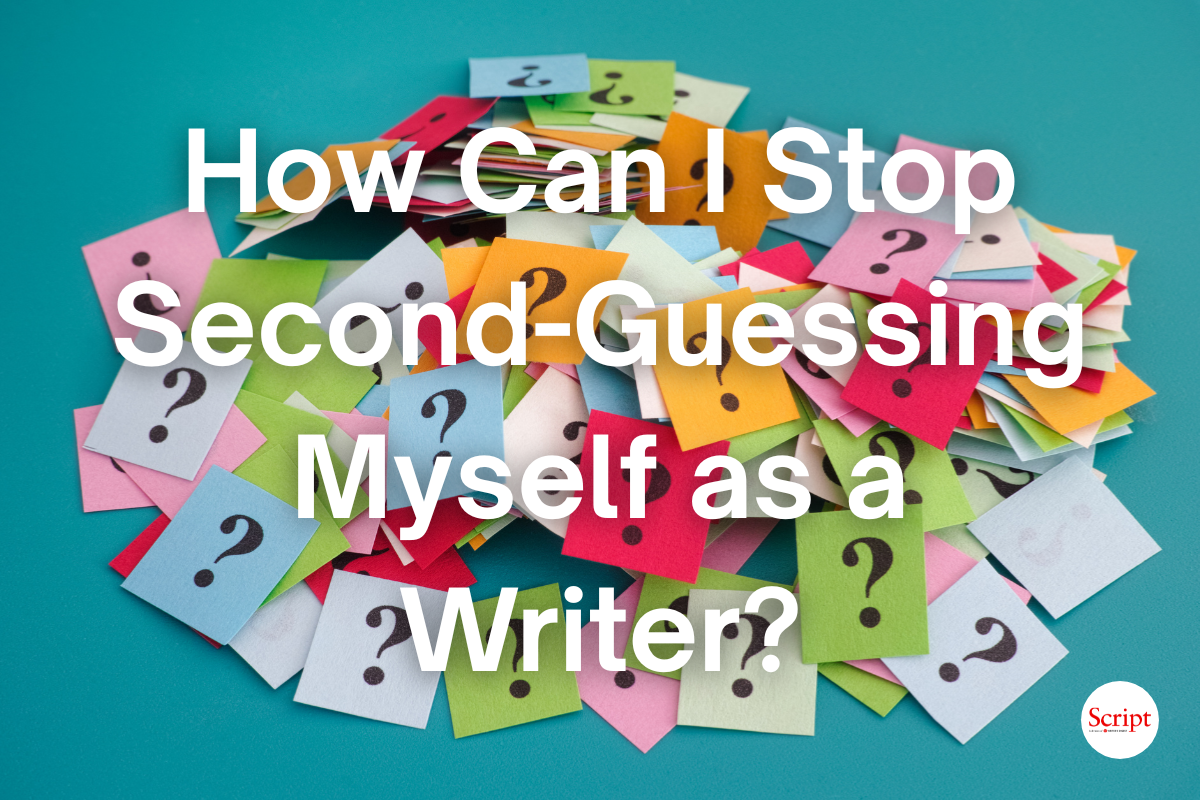6 Antidotes for Self-Doubt in Writing
Writing coach Jenna Avery answers a reader’s questions about managing self-doubt in writing.
Welcome to “Ask the Coach.” As a writing coach, I answer questions from writers about making the work of writing happen, tackling craft, business, and personal questions along the way. (Have a question you’d like answered? Check the details at the end of the article about how to submit one.)
Today I’m addressing a set of questions from a reader about managing self-doubt.
This is a set of challenging questions so many writers wrestle with. It reads to me like issues of self-doubt more than a fear of failure, though the two are intertwined.
First let me say this: In working with writers all over the world, being a writer myself, and reading first-hand accounts of seasoned, professional writers, so many if not all writers deal with self-doubt and fear much of the time (including me).
The real key to all of this is learning to manage the doubts and the fears so they don’t stop you from writing, and so that they don’t make the experience of writing miserable along the way, by triggering overwhelming negative self-talk, habitual procrastination, perfectionism, and even shame.
Here are some thoughts for you (for all of us!) about how to do this:
1. Use self-doubt as a clue that what you’re working on is important.
Steven Pressfield, one of my favorite authors on the subject of creating work in the face of doubt and resistance, wrote about this on his blog recently, saying:
So if you’re feeling increasing self-doubt, fear, and resistance to writing, chances are you’re working on exactly the script or writing project you most need to tackle.
2. Trust that truth transcends differences.
You mentioned that you’re making your writing as truthful as possible, but wondering if it will only be something you relate to personally. I believe when we write as truthfully as possible, we transcend differences and make deeper connections to which others will relate.
This isn’t to suggest that everyone will connect with what you write, but see if you can expand your consciousness to include the thought that there are people out there who will connect with and be gratified by what you are creating.
And, there are universal human truths and experiences we all share, like our needs for love, survival, safety, actualization, and individuation, or our pursuits of healing, joy, recovery from grief, and more. I suspect if you look deeper into what you’re creating, you may find some of these themes hidden in your work.
7 Tips for Getting Back to Writing After Summer
3. Ask yourself empowering questions.
When we ask ourselves questions, our minds go to work answering them. So when we ask questions that invite unsupportive answers, we keep ourselves stuck in a disempowered mindset and not feeling good about ourselves.
Learning to ask yourself more empowering questions will change the inner conversation you’re having with yourself.
Let’s take a question you asked as an example: “What if no one likes my writing?” The only kinds of answers your mind can respond with are by design limited to the likelihood of failure or, at best, arguing with yourself about it.
Alternatively, you might try something like, “I wonder who will relate to and connect with my work?” This sets your mind the task of wondering about all the people out there who will love what you do.
Wondering is a powerful strategy, because it is expansive and generative. The explorations it triggers often take place in the back of your mind, popping up with ideas when you least expect it. (Tip: “wonder” about story challenges before you go to bed, take a shower, or go for a walk.)
Ask empowering questions in order to put your focus on positive possibilities for you and your writing.
How Can I Keep Up My Confidence In Myself as a Writer?
4. With memoir, write for yourself first.
When it comes to memoir, write the truth as you see it first. You don’t have to show it to anyone in its raw form. Once you’ve written it, then you can decide if you want to edit or fictionalize details to protect people who might feel impacted by what you’ve written, or talk to them about it (if those involved are still living). You may also want to review it for potential legal issues.
One of the uncomfortable truths we all have to live with is that the people around us have their own experience of our mutual interactions. They will not see things the way you see them, and vice versa. There is something to be said for having the courage to tell your version of the story, regardless of how others feel about it.
Having said that, your feelings of guilt and disloyalty are real feelings. I suggest writing about the writing, perhaps in a journal, and exploring, giving yourself permission to feel how you feel about the experiences you’ve had and any feelings about your parents as well.
Although I’m not a memoirist, I’ve heard good things about the book Naked, Drunk, and Writing: Shed Your Inhibitions and Craft a Compelling Memoir or Personal Essay by Adair Lara, which may prove helpful for you. (Bookshop* | Amazon*).
5. Embrace the vision while also welcoming imperfection.
One of the great challenges of being a writer is that it entails being a visionary, which means being able to imagine great possibilities in their fullest glory clearly in our minds. But then we have to do the hard work of bringing the vision down to the earthly plane and making it real, where most of the time, some of the gleam gets a little tarnished.
The key to this is twofold.
First, embrace the vision, fully. Stretch yourself to give completely to the story you’re creating. Encourage yourself not to hold back or play it safe, even when wrestling with self-doubt. We all know when something’s not working or we’re pulling our punches, but it feels like too much work to address, so we don't or we make excuses. Instead, stick with issues you see in your work and stay willing to keep writing and brainstorming until they’re fully solved. Give it your all and let your work be as fully magnificent as it deserves and wants to be.
Second, welcome imperfection. Simultaneously and contradictorily, embrace yourself as a flawed, imperfect human being (just like the rest of us) and love your imperfect work wholly, warts and all.
6. Trust the process.
You also mentioned having a sense of impostor syndrome, while at the same time being happy with what you write in the end. Liking what you write “in the end” is what matters here.
I’ve always believed that a challenge with the writing process in the modern age is the way typed words look so finished on the page, triggering a sense that they should therefore be as high quality as a published, finished book or script. This doesn’t leave room for all the work that will happen after a first draft is created.
How Can I Prioritize Writing (And Get Others to Understand)?
You’re not alone, keep doing the work, and then see what you have when you’re done. Most likely, you'll like it! Tell the part of you that thinks you're an impostor to wait until the work is finished to decide.
“I have written 11 books, but each time I think, ‘Uh oh, they’re going to find out now.
I’ve run a game on everybody, and they’re going to find me out.’”
—Maya Angelou
That’s a Wrap
Writing and creating triggers self-doubt for so many — if not all — writers. The secret is not trying to eliminate it, but to understand that the inner work we do with ourselves — what we say to ourselves, the questions we ask ourselves, and the way we think about and approach writing — has as much to do with writing (if not more) as the actual stories.
You may have noticed that many of the solutions and approaches I’ve suggested today invoke trust. Trusting yourself, trusting the work, trusting the process — even trusting resistance! Ultimately, the antidote to self-doubt is self-trust, and self-trust is something you build with yourself as a writer over time. Every time you show up to write, you build trust with yourself. Every time you see the process through to the end, despite the self-doubt, you build trust with yourself. And so on.
The best part is, when you start the next script or writing project and the fears and doubts start shouting again, you’ll be able to remind yourself that you made it through the last time.
Screenwriters, what challenges do you run into that you'd love to see us address in our articles? Take our short survey here, submit your question to be answered anonymously via my online form here, or email me directly at askthecoach@calledtowrite.com. Look for answers to selected questions in my monthly “Ask the Coach” column on the third Thursday of the month.
Find me on Twitter @JennaAvery and Bluesky @jennaavery.bsky.social.
* Referral/affiliate link







